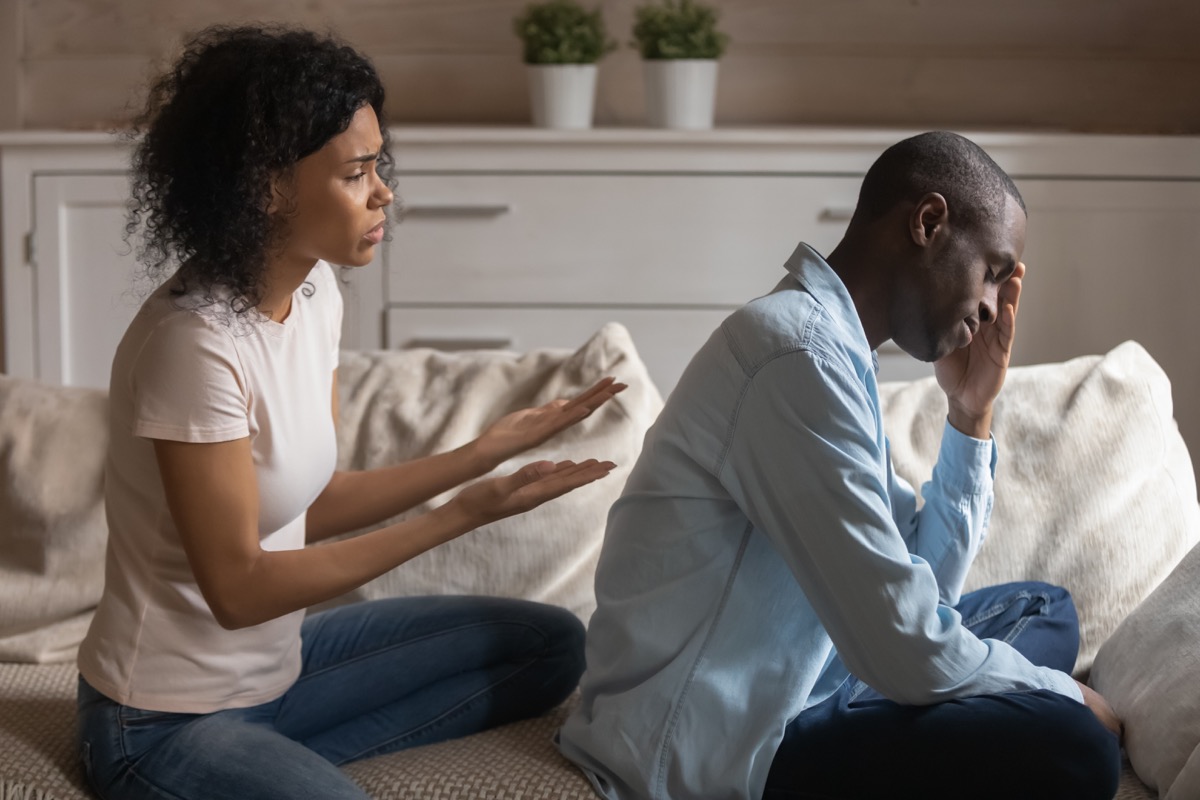“The word ‘but’ is not an apology—it is self-protection disguised as an apology,” says Tasha Seiter, MS, AMFT, who owns her own marriage and family therapy practice in Fort Collins, Colorado. Seiter says the problem with the word “but” is that once it’s uttered mid-apology, it is the only word the listener will focus on. Even if you are sincere in saying sorry, the person you’re apologizing to “will immediately get defensive when they hear this word,” she says. Not only that, but Alexa Cavaseno, LICSW, clinical social worker and psychotherapist in Washington D.C., also says that the word “but” often makes you look like you’re blaming the other person. “Using ‘but’ undoes the part of your apology where you take responsibility for your actions and puts the blame back on the other person,” she says. For example, you may say, “I am sorry I did not take out the garbage last night, but you forgot to remind me.” The “but”—and what follows—weakens your apology because it appears as if you are trying to excuse yourself from the responsibility of your actions. That said, you don’t have to avoid explaining yourself entirely when apologizing, according to Seiter. Explaining yourself is important when offering an apology, as the other person most likely needs to hear why you did what you did so that they have a clear understanding about what is hopefully an isolated event. That way, they’re not “left wondering if you will do it again,” Seiter says. However, that explanation still shouldn’t include the word “but.” Instead, simply swap the word out for “and,” Seiter says. For example, instead of saying, “I’m sorry I snapped at you, but it was a long day for me. I was in a bad mood,” say, “I’m sorry I snapped at you, and it was a long day for me. I was in a bad mood.” According to Seiter, “word choice is so important in an apology because we have a physiological response to certain words.” And if you’re curious as to what other words may weaken your apologies, read on. Plus, for more words to avoid every day, check out Using These Words Instantly Makes You Sound Less Intelligent, Study Shows. According to Talia Litman, MS, New York-based marriage and family therapist, the word “if” is often used to deflect accountability onto the person you’re apologizing to. It “implies that the accountability lies with them, because of their interpretation of your comments,” she says. She recommends trading the word out for “that.” So instead of saying, “I’m sorry if my comments made you upset,” say, “I’m sorry that my comments made you upset.” And for more ways to change the way you speak, check out Cut These 20 Negative Words from Your Life and Be Instantly Happier. Though Seiter says explaining yourself can be important in an apology, that doesn’t mean you should try to justify your actions. The word “because” often functions to do just that, says Martin Woods, founder of communication company Indigoextra Ltd. This easily turns a good apology into “an excuse, or worse, blame,” he says. And for more words to stop using, check out The One Word Older People Should Never Say.ae0fcc31ae342fd3a1346ebb1f342fcb This one may be obvious, but in the midst of apologizing and explaining yourself, you may slip up and throw in a “whatever.” According to Gaurav Dhir, MS, researcher for HelpAndWellness, on its own, the word “whatever” signifies that “you do not care and are practically checked out from the conversation.” Also, if you use the word at the end of a sentence—as in “or whatever”—it can seem like you’re either unsure of your apology or you are just trying to rush to end the conversation, Dhir says. The word “feel” only works in an apology if it’s describing how you feel, says Ned Presnall, LCSW, owner of Plan Your Recovery and researcher at Washington University. That means “I’m sorry you feel that way,” is not a good apology. “An apology should never be about how you made somebody feel, because it’s like saying the other person has sole ownership over their reaction and the situation, which is invalidating,” Presnall explains. “And if you’re apologizing for how somebody feels, you’re taking that which is theirs and claiming it for your own. Then you make a person try to defend something that’s un-defendable, because feelings are never up for debate.” And for more useful content delivered straight to your inbox, sign up for our daily newsletter.



